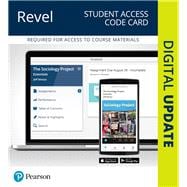An inquiry based approach to spark the sociological imagination
Organized around the big questions in the core subfields of the discipline, Revel™ The Sociology Project: Essentials shows how sociologists analyze our world, and sets students off on their own journeys of sociological inquiry. Each chapter of this brief text has been authored by one or more faculty members from the NYU Sociology Department who write and teach in a specific subfield. This collaboration offers a unique approach that draws on the collective wisdom of a large, successful sociology department to reveal how individuals are shaped by the contexts in which they act and live. At its core, The Sociology Project: Essentials seeks to inspire each student’s sociological imagination, highlighting the personal relevance of key concepts and instilling in each reader a new determination to question the world around us.
Revel is Pearson’s newest way of delivering our respected content. Fully digital and highly engaging, Revel replaces the textbook and gives students everything they need for the course. Informed by extensive research on how people read, think, and learn, Revel is an interactive learning environment that enables students to read, practice, and study in one continuous experience — for less than the cost of a traditional textbook.
NOTE: Revel is a fully digital delivery of Pearson content. This ISBN is for the standalone Revel access card. In addition to this access card, you will need a course invite link, provided by your instructor, to register for and use Revel.












